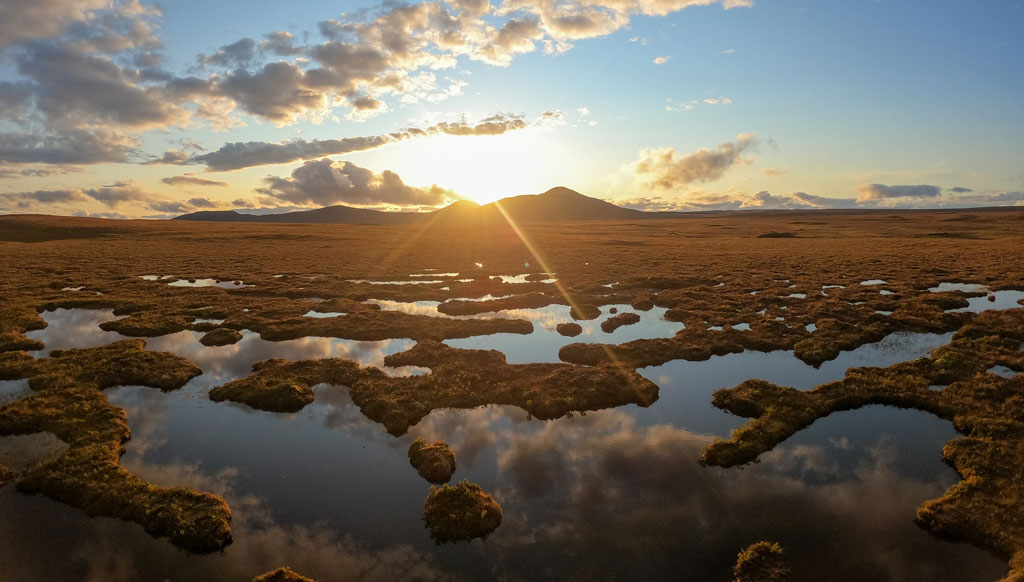We have seen ‘Nature-based solutions’ (NBS), sometimes referred to as Natural Climate Solutions (NCS) rapidly gaining traction over the last few years, having not existed to any meaningful degree before that – at least as a concept, if not in practice. As a bona fide buzzword in the sustainability space, and a concept fundamental to our Real Wild Estates mission and indeed business model, it is worth taking a closer look at what lies behind this.
NBS refers to a range of projects which protect, improve or restore land and ecosystems in order to absorb more CO2 emissions from the atmosphere, thereby helping to mitigate climate change. While many may already be familiar with ‘forest-carbon’ – the (re-)planting and protection of trees to lock up carbon – as the best-known example of NBS, it also includes a wide range of natural ecosystems which sequester significant (and often greater) amounts of carbon. This includes peatlands (especially relevant to RWE given the significant peatland areas in the UK – more on that at a later date), grasslands, wetlands and ‘blue carbon’ – carbon captured by the world’s ocean and coastal ecosystems (e.g. seagrass meadows, mangroves and salt marshes).
NBS represents one of the cheapest and most effective tools we have at our disposal to meet the goals of the Paris Agreement; a study in 2017 calculated that NBS is capable of providing more than 33% of the cost-effective climate mitigation needed by the end of the decade to limit warming below 2 degrees. Another study in 2019 cites forest restoration as one of the cheapest and most effective strategies for climate change mitigation, claiming it has the potential to store around 66% of all carbon emissions from human activities that exist in the atmosphere today.
In addition to its effectiveness in removing carbon from the atmosphere (or preventing its release), we’ve seen first-hand how NBS projects help create in-tact, biodiverse ecosystems crucial for the flipside of the coin, namely supporting society in adapting to the climate change impacts we have already set in motion. For example, mangroves provide coastal communities with protection from storm surges, restored wetlands and forests serve as buffers against flooding and mud-/landslides, green spaces provide shade and cooling for urban heat islands, while healthy, biodiverse forests can help mitigate droughts and are typically more resilient to pest and fire outbreaks which will proliferate in our changing climate.
Aside from its benefits in mitigating and adapting to climate change, NBS projects provide a range of very important co-benefits (or ‘ecosystem services’) which underpin businesses, communities and livelihoods; this includes improving water security, creating suitable micro-climates for crop cultivation, regulating pest and disease outbreaks, providing habitats for commercially or culturally important species and crops (e.g. fish nurseries) and protecting biodiversity for tourism, medical research, food security and R&D breakthroughs etc (a recent favourite being how algorithms behind autonomous vehicles are mimicking the way ants optimise their search for food to avoid accidents and creating traffic).
Recognising the many and diverse benefits of NBS, a number of businesses and organisations have used it to both meet climate change targets and boost the resilience and performance of their own supply chains and operations simultaneously – also known as ‘Insetting’. To give one example, both Ben & Jerry’s and Nespresso have invested in agro-forestry projects to offset their carbon emissions, but also to provide ideal growing conditions for their crops (e.g. coffee, cocoa), including protection from landslides, soil erosion and heavy rain, and for the provision of shade and stable micro-climates.
Set against a backdrop of growing concern for nature loss and an ever-diminishing timeline for climate action – and with ever greater focus on nature during the recent climate COP in Glasgow (to say nothing of the landmark ‘Nature’ [CBD] COP in China later this year), I believe the stage is set for NBS to rapidly become one of the most powerful and versatile tools available to us in our bid to tackle climate change and the growing nature crisis.

